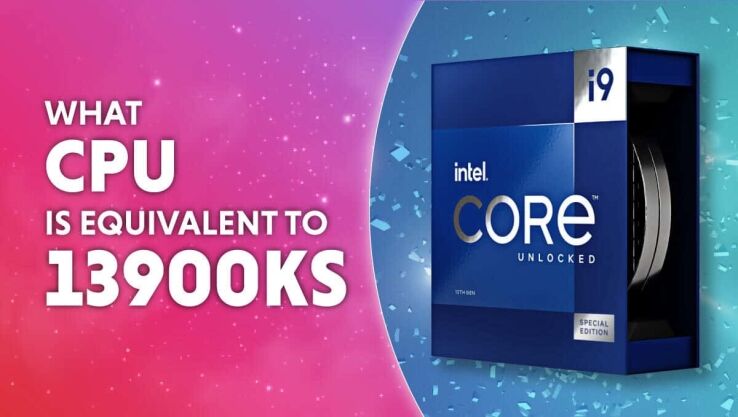What CPU is equivalent to i9-13900KS
What CPU is equivalent to 13900KS? Let's find out

WePC is reader-supported. When you buy through links on our site, we may earn an affiliate commission. Prices subject to change. Learn more
The Intel Core i9-13900KS is currently the fastest desktop processor in the world. In this article, we’re taking a look at it under the microscope to find out what processors come the closest to matching its specs and performance. So, without any further delay, what CPU is equivalent to 13900KS?
Now Read: Best CPU for gaming in 2024
Intel Core i9-13900KS specifications
Here are the 13900K’s official specs
- Core Count: 24
- Performance Cores: 8 (Hyperthreading Enabled)
- Efficiency Cores: 16
- Total Threads: 32
- Combined Cache: 68 MB
- P.Core Base Clock: 3.2GHz
- P.Core Boost Clock: 5.4GHz
- P.Core Max Clock with Thermal Velocity Boost: 6GHz
- E.Core Base Clock: 2.4GHz
- E.Core Boost Clock: 4.3GHz
- Base TDP: 150 Watts
- Max TDP: 320 Watts
- Socket: LGA 1700
As obvious from these specs, the 13900KS is a powerhouse of a processor. The 6GHz maximum clock speed boasted by this processor at stock values is the current world record. With 24 cores and 32 threads, the 13900KS is capable of rivaling server-grade processors in multicore performance. A truly impressive chip.
What CPU is equivalent to the Intel Core i9-13900KS?
While there is no exact equivalent to the Core i9-13900KS, a few processors come pretty close, especially if we consider performance in realistic use cases. The closest equivalent to the 13900KS is a processor that’s due for release on February 28th – the Ryzen 9 7950X3D from AMD.
AMD Ryzen 9 7950X3D
We already had the Ryzen 9 7950X released in Q4 2022. Unfortunately, it doesn’t quite offer the same performance as the 13900KS. It failed to compete with the 13900K, much less the 13900KS. Here’s more on 7950X vs 13900KS.
AMD Ryzen 9 7950X
Cores
16
Threads
32
Base Speed
4.5GHz
Boost Speed
5.7GHz
Cache
64MB
Socket
AM5
This is why we’re going with the 7950X3D here – essentially a 7950X but equipped with AMD’s powerful 3D V-cache upgrade (and benefitted by a moderate decrease in power consumption).
If you don’t know what 3D V-cache is, we explain it in our Ryzen X3D article. But essentially, 3D V-cache technology involves stacking L3 cache vertically on the processor die, which allows for much more of it to be made available to the processor.
In this case, the Ryzen 9 7950X3D will feature an incredible 128MBs of L3 cache over the 7950X’s 64MB, which we expect will give it an appreciable boost in performance in various workloads. Most notably in gaming, an activity that benefits massively from the extra V-cache.
The Ryzen 9 7950X3D has a great shot at dethroning the 13900KS as the best gaming processor. If it does, it likely won’t be by a huge margin, though. We’ll give you an update on how exactly the two processors compare in the most popular games as soon as the 7950X3D comes out.
Meanwhile, here’s our 13900KS vs 7950X3D comparison article if you’d like to learn more.
In multithreaded performance, we expect the Intel i9-13900KS to retain its top spot. That’s because the extra cache has been shown to not benefit multithreaded workloads as significantly, so it boils down to a battle of cores and clocks. And in that competition, the 13900KS has an upper hand, with a 6GHz max clock speed over the 7950X3D’s 5.7GHz max clock speed.
Final thoughts
The CPU that comes closest to offering us the same performance as the 13900KS is going to be the 7950X3D. We expect it to perform slightly better in gaming due to its V-cache enhancement, but slightly worse in multithreaded workloads.
Practically, the differences between the two of these processors are likely going to be pretty minute, which makes them near exact equivalents and excellent alternatives to each other.